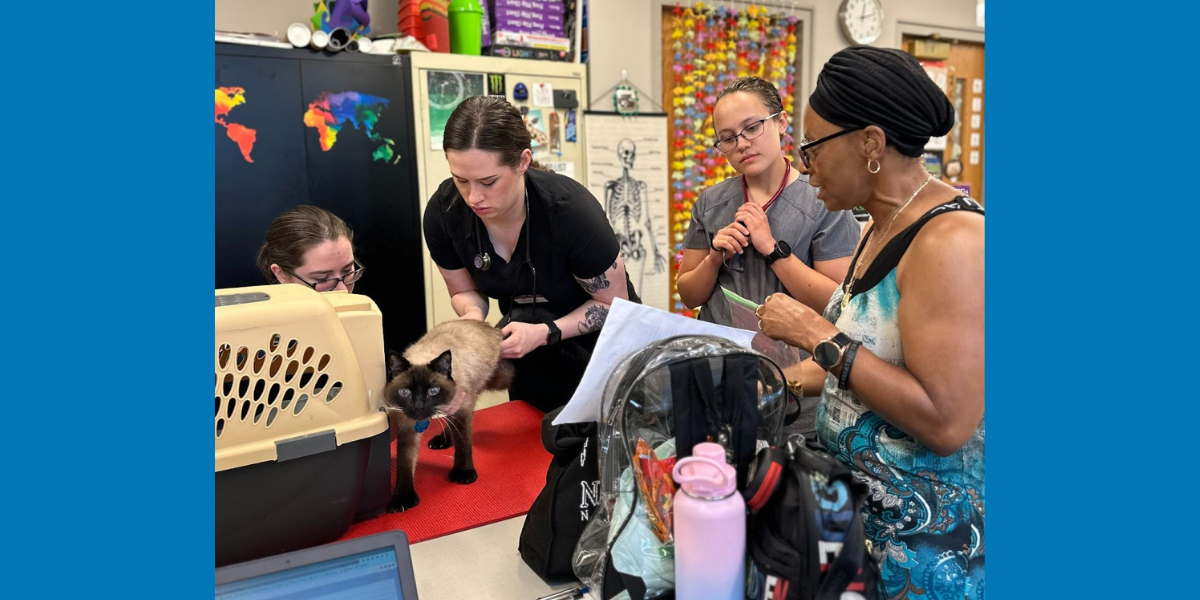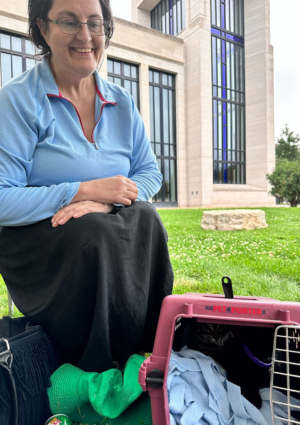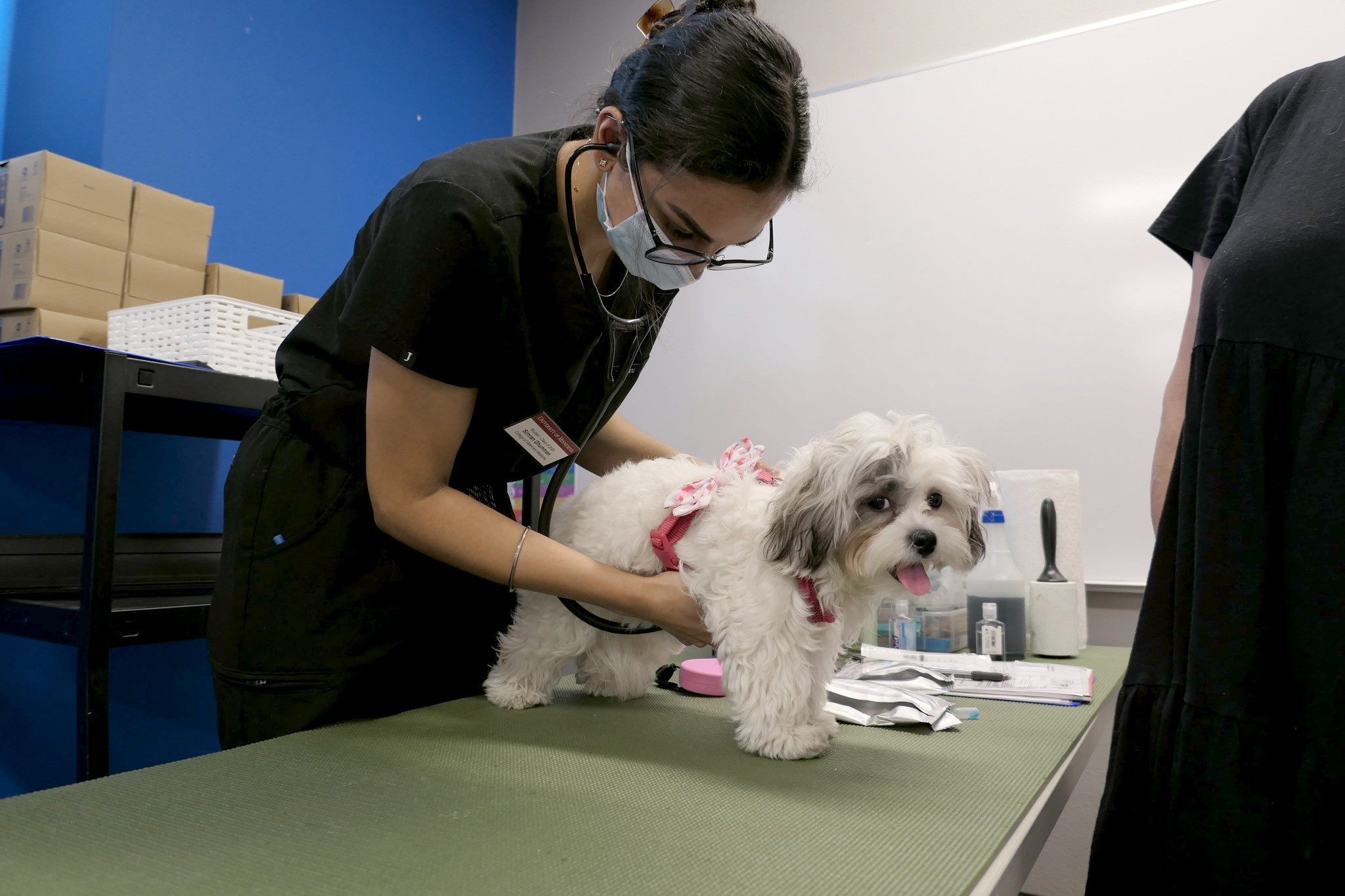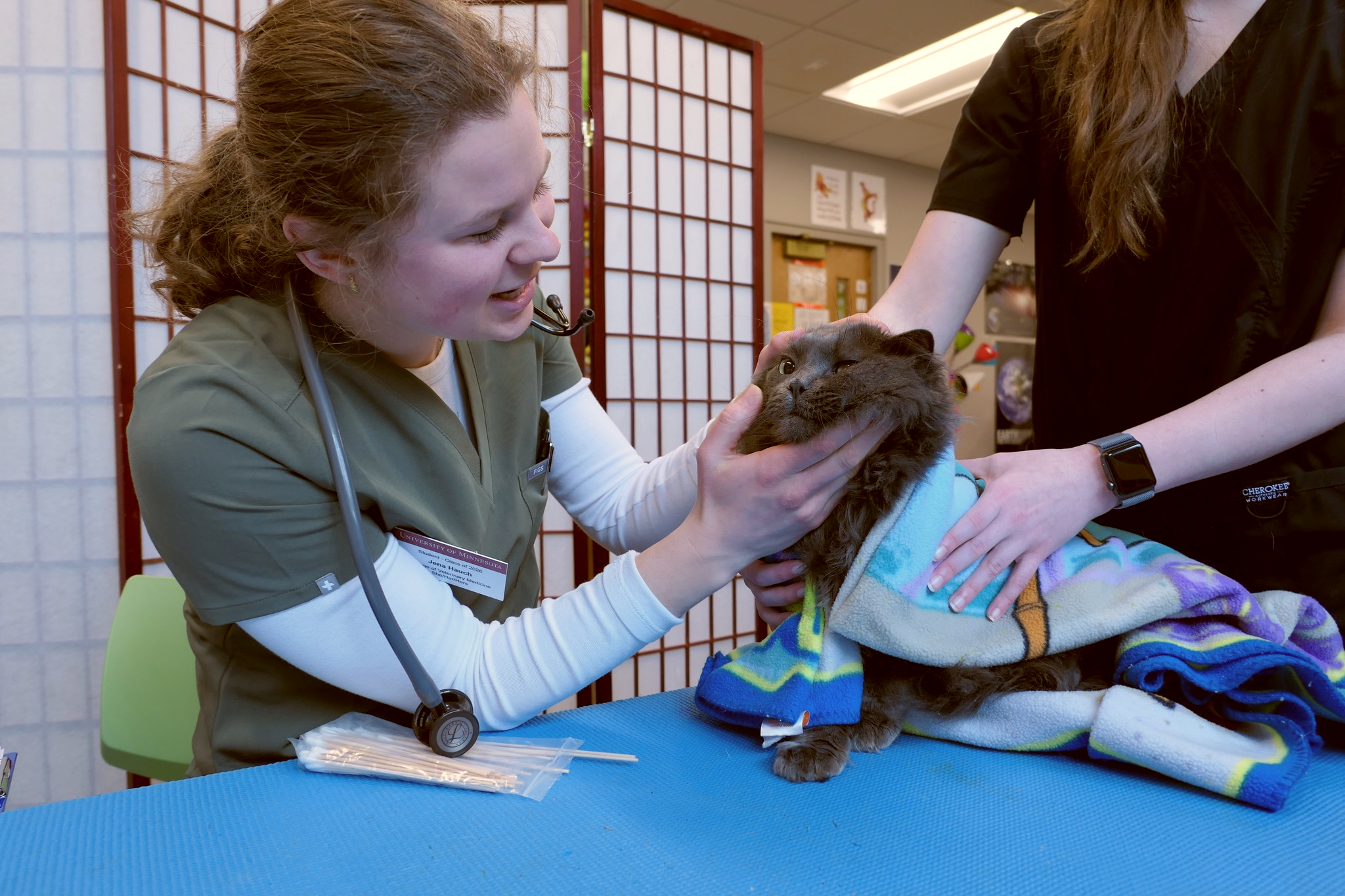Committed to compassion
Student-run community clinic gives back through free veterinary care

Student-run community clinic gives back through free veterinary care
Cathy, a community leader and activist (far right), speaks with VeTouch students and staff about her cat’s recent appetite changes.
One Sunday afternoon each month for years, the basement of a Minneapolis church underwent a transformation. Volunteers with VeTouch, a group of clinicians, students, and technicians from the College of Veterinary Medicine (CVM), converted the space into examination areas and offered free care for local pets.
The clinic has since moved to a new location at 2501 Minnehaha Ave. in Minneapolis, where the care provided by its student volunteers remains in high demand and appointment slots fill up quickly.
The pet owners seeking care for their animal companions from VeTouch fit no single profile. Instead, clinic patrons tell a wide range of stories of persevering through challenges such as chronic health conditions and income and housing insecurity.
The clinic allows them to avoid choosing between meeting their basic needs and those of their pets. Filled with gratitude and relief for the opportunity to obtain veterinary care for their pets, they patiently wait for their cats or dogs to be seen by veterinary staff.

One client, Isabella, completed her PhD coursework in classic studies and previously taught Latin. Unfortunately, memory loss incurred following treatment for depression and PTSD left her no longer able to work. The two kittens accompanying her to her appointment, Scout and Squeak, officially qualify as emotional support animals.
The kittens bring comfort to Isabella, who has survived the unimaginable in her lifetime. At 8 years old, she witnessed her mother’s brutal murder at the hands of her father.
“My life has been difficult, but little blessings in my life, such as my new kittens, and meeting other caring people, such as VeTouch volunteers, allow me to smile,” she says, adding, “Such gratuities in the community make life beautiful, and VeTouch fosters a reciprocal kindness into our community with their care to our animals.”
With the need for pet care high but resources limited, appointment demand at the VeTouch clinic outpaces supply. Those unable to secure a visit may try again to obtain veterinary care for their pets the following month or may receive a list of other community clinics that offer services.
Expanding access to affordable veterinary care to help meet those demands has the potential to improve not only the health of pets but also their owners. Increasingly, veterinary and human health professionals collaborate under the One Health concept, which integrates care delivery using a team approach. Providing care for pets becomes an essential part of caring for people, and, in the end, the result is better health—reducing certain healthcare costs on the human medicine side of the equation.
VeTouch also partners with the Phillips Neighborhood Clinic (PNC), an interprofessional, student-run clinic involving the University of Minnesota Medical School, School of Nursing, College of Pharmacy, School of Dentistry, School of Public Health, and others. A free clinic, PNC brings together students from multiple health professions to care for an underserved population under the guidance of an interprofessional team of preceptors.
"We recognize the value that animals bring to the lives of their people,” says Dr. Whitney Waldsmith, an assistant professor at CVM and a veterinarian with a community medicine focus. “In community medicine, our goal is to provide an important service to our neighbors and their animals, and to help students understand the broad One Health implications of these services. Working with the PNC is a great way for veterinarians to better understand the needs of our community and create stronger relationships.”
The partnership between VeTouch and the PNC seeks to bridge human and animal medical teams and enhances care for all. Dr. Lauren Bernstein, a CVM assistant professor with a focus in community medicine, dedicates a large portion of her time to sustaining the human-animal bond by caring for vulnerable populations of people and pets.
“Caring for pets is caring for people,” she says. “When pet owners experience barriers to their own medical care, food security, housing, or social supports, their companion animals’ health and welfare may also suffer. Our hope is to provide pets with reliable and excellent care while providing our clients with compassionate, relationship-centered customer service that meets their unique needs.”
Cathy, a repeat VeTouch client, knows the value of pet ownership in vulnerable populations. She works in a local recovery organization supporting those suffering from substance use disorder but attempting to transition toward a more healthy and productive lifestyle. The comfort offered by pets is significant to those experiencing physical or mental health challenges or who are financially insecure or houseless.
“Those experiencing houselessness, in particular, need something to hug or cuddle and to give them unconditional love,” she says.

The experience of organizing care clinics is beneficial not only to the community served but also to the student volunteers. VeTouch allows for experiential learning that hones the skills necessary for students to serve a diverse array of pets and clients in their careers as veterinary professionals.
With at least a quarter of U.S. families reporting difficulty accessing veterinary care for their pets, the need for students to deliver a wide range of care is real.
Not all pet owners can afford every diagnostic test or treatment option available. Some pet owners depend on community clinics or other services to care for their animals and simply cannot afford to give their pets “gold standard” care.

VeTouch president-elect and second-year veterinary student Anna Hedger is a regular volunteer at the clinic, where she values serving the community, interacting with clients, and working with other students to learn how to implement a spectrum-of-care approach as future veterinarians.
To Hedger, community clinics such as VeTouch are critical to meeting the needs of all pet owners.
“Pet owners need a range of choices,” she explains. “A patient presenting with chronic gastrointestinal issues could benefit from an abdominal ultrasound and endoscopy. These are not the only options though—their owners should also be informed of more accessible treatment plans such as diet changes and medications.”
Since opening in 2008, the VeTouch clinic and its volunteers has been able to provide care to nearly 6,000 animals. The impact of that care extends beyond enhancing the health of pets. It touches the lives of all involved, shaping the careers of future veterinarians and allowing underserved community members to forge healthier lives for their pets and themselves.